LATEST INSIGHTS
Your Present Location: LATEST INSIGHTS2 Reports and 9 Experts Calling for China's Economic Recovery and Reform
On September 14, 2023, RDCY Macro Situation Forum (Autumn 2023) entitled “Scarring Effect and China's Economic Recovery: New Challenges and New Opportunities” was successfully held in Beijing, jointly organized by Chongyang Institute for Financial Studies, Renmin University of China (RDCY) and Cedrus Group, a renowned international investment company. More than a hundred people attended the meeting on site, with over ten experts and scholars in financial and economic fields participating and delivering speeches. More than 30 Chinese and foreign media, including China News Agency, China Securities Journal, Shanghai Securities News, Securities Times, Securities Daily, Economic Observer, Economic Reference News, China Daily, China Economic Review, Beijing TV, Shenzhen TV, Sansha TV, China.com.cn, Zhonghong.com of National Development and Reform Commission, the paper.cn , the Financial Times, MNI and Singtao Daily of Hong Kong, were on the scene to report.
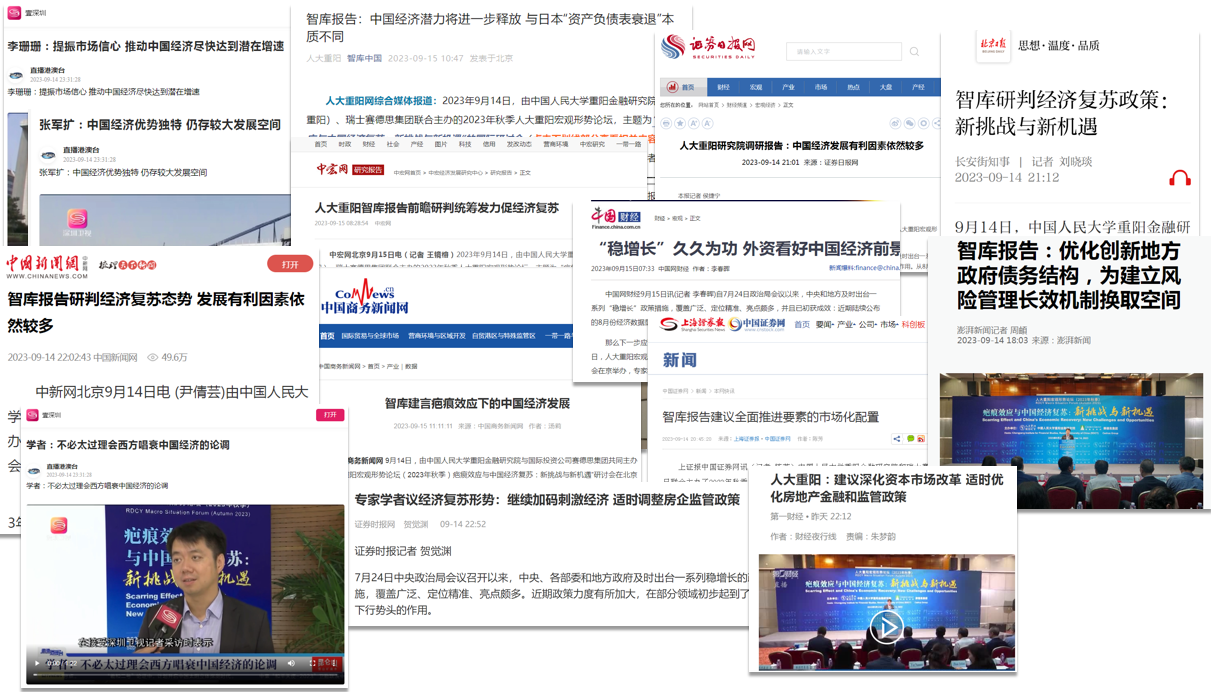
In the report release session, Wang Wen, Executive Dean of RDCY, and Rani Jarkas, Chairman of Cedrus Group, successively released two research reports, namely, “Stimulus brought by Tinkering is not enough while Resolute Reforming is the Right Way- an Assessment of Economic Policies Since the Second Quarter of 2023” and “China’s Economy in the Eyes of Foreign Investors”.
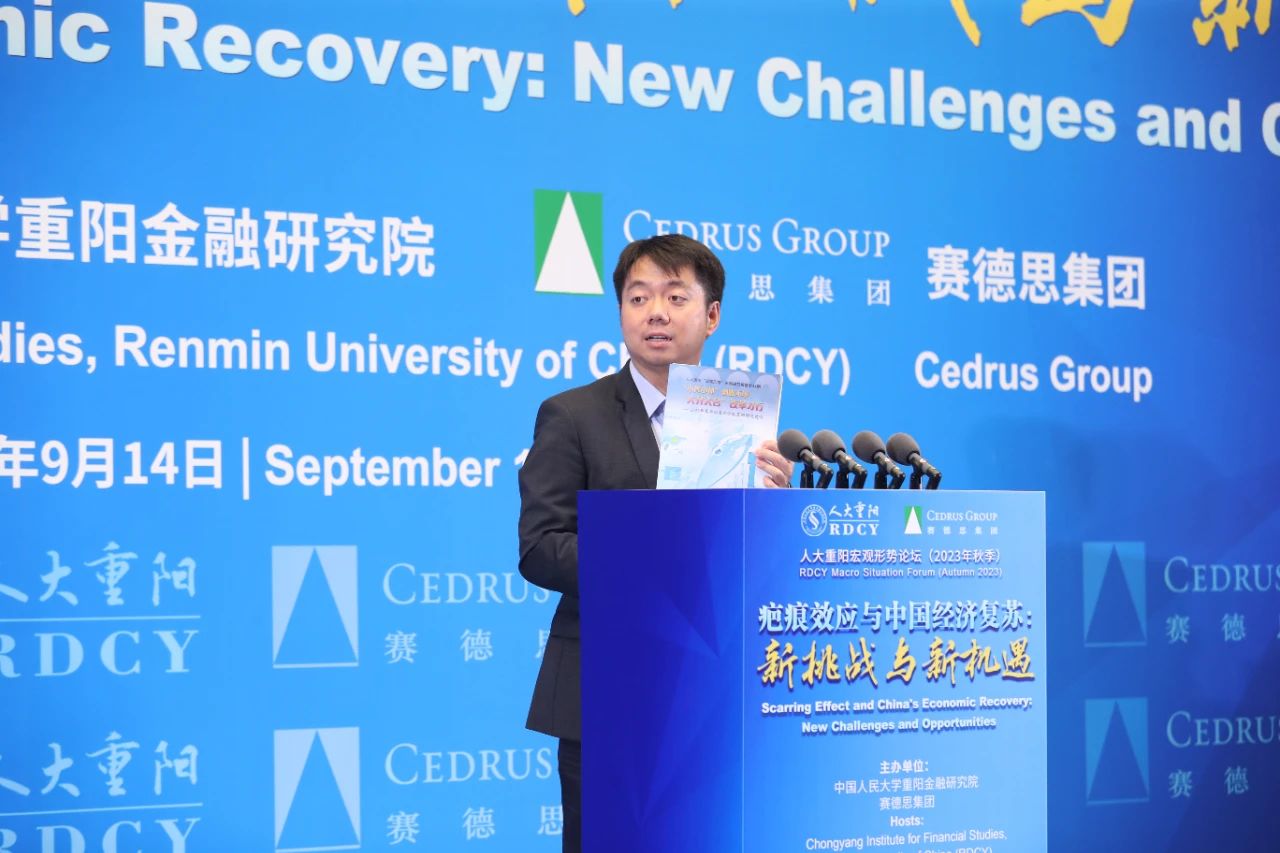
Wang Wen, Executive Dean of RDCY
Wang Wen contended that since the second quarter, the central ministries and commissions have issued a series of policies and measures featuring precise positioning, tremendous highlights and extensive coverage to stabilize growth. However, after a number of research, we found that the recent policies were mostly at the level of symptoms of the “small repairs” and beneficial to a small number of groups. The underlying policy is needed and the persistence of benefits of private enterprises is still doubtful. A few policies were tinted with administrative intervention and planning. The report concludes that "we need to fight for the economy, deepen the reform and expand our opening up! The report “Stimulus brought by Tinkering is not enough while Resolute Reforming is the Right Way- an Assessment of Economic Policies Since the Second Quarter of 2023” puts forward nine recommendations for policy optimization and deepening of reforms from three aspects. Firstly, in terms of improving a fair and neutral competitive environment for market players: 1. Deal fairly with the issue of arrears to private enterprises, and rectify historically influential cases of wrongdoing by private enterprises; 2. Improve the investor protection system, and enhance the safety of domestic investment; 3. Identify the focus point, and optimize the structure of tax increase with greater precision. Secondly, in building an inclusive and modernized financial system: 1. clarify the boundaries of inclusive and commercial financial services, and improve financial and regulatory policies of real estate at a proper time; 2. expand the opening of the financial sector internally and externally, and regulate market access thresholds; 3. Optimize and innovate the structure of local government debt, and mitigate the “last-mile” risks of the local debt. Thirdly, in promoting market-oriented allocation reform and accelerating the transformation of government functions: 1. effectively and comprehensively promote the market-oriented allocation of factors; 2. accelerate the implementation of the transformation of the functions of local governments, and strengthen the mechanism of power constraints and supervision; 3. reform the performance appraisal system of local officials. More reforms will promote more economic growth, and we are full of confidence in China's economy in the future.
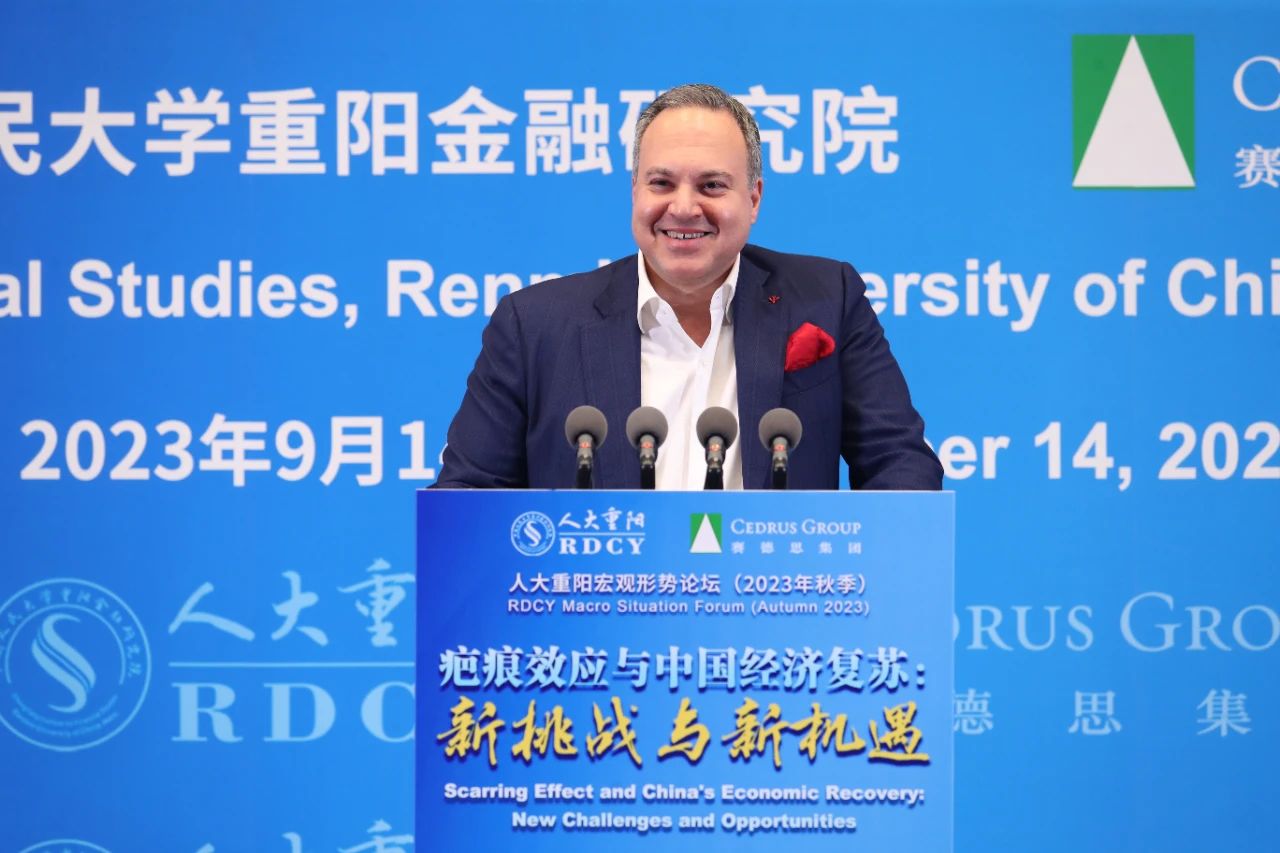
Rani Jarkas, Chairman of Cedrus Group
Rani Jarkas released the report on China’s Economy in the Eyes of Foreign Investors. The report points out that a series of economic data recently released by China's National Bureau of Statistics (NBS) for the second quarter of 2023 fell short of optimistic expectations, with many analysts speculating that the data signaled an imminent end to the world-beating growth that China has achieved over the past few decades. Cedrus Group believes that the pessimistic view of China has been politicized and biased, and that China's economic outlook should be more optimistic. After the turmoil caused by Covid-19 pandemic, the Chinese economy is once again the “locomotive” of the world economy. China's absolute dominance in manufacturing has shifted from being a “world factory” relying mainly on low-cost production and processes to being an innovator in a wide range of technologies. China has made breakthroughs and taken the lead worldwide in a number of key strategic emerging industries. Although China's sluggish real estate market is a drag on China’s economy, the average personal mortgage default rate in China is only 0.45%, much lower than that of the United States (3.4%) and the United Kingdom (2.5%). China maintains a flexible macroeconomic framework that is able to adapt and respond to changing demands and dynamic conditions, while providing a buffer against any macroeconomic volatility and external shocks. Cedrus Group believes that the situation that the strong USD and weak RMB will be quickly reversed in the near future as Fitch downgrades its rating on the US sovereign debt. According to Cedrus Group’s analysis, China will benefit from a number of emerging sectors that are expected to become new engines of growth, including electric vehicles, artificial intelligence and 5G/6G. We believe that China's economic outlook should be much brighter than some analysts or economists portray it to be.
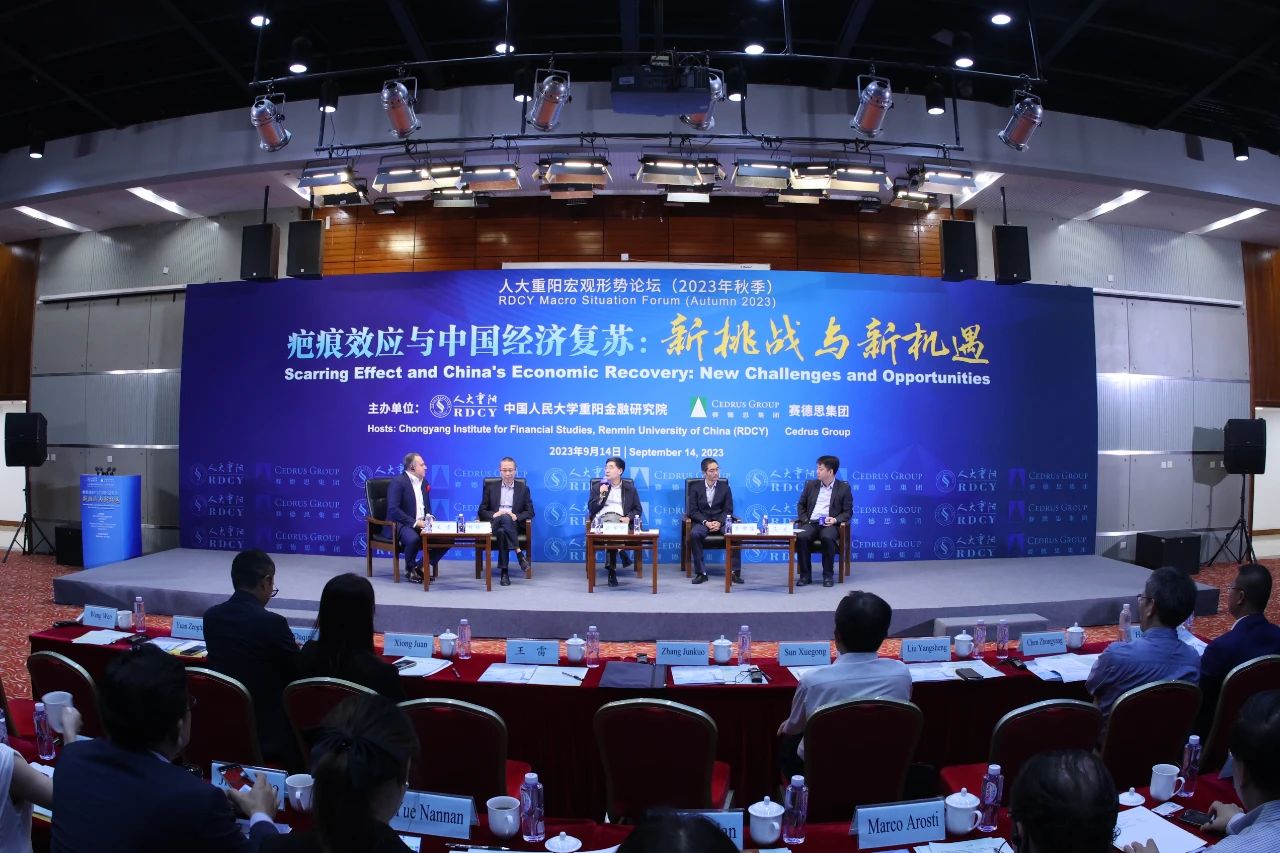
In the ensuing guest speeches and discussions, Zhang Junkuo, Chairman of the China Development Research Foundation and former Deputy Director of the Development Research Center of the State Council; Sun Xuegong, Director of the Decision-Making Department of Academy of Macroeconomic Research, National Development and Reform Commission; Liu Yangsheng, Founder of HAO Capital; Mao Daqing, Founder and Chairman of Ucommune; Yuan Zengting, Deputy Director of Financial Risk and Supervision Research Office, Institute of Finance & Banking, Chinese Academy of Social Sciences; Chen Zhongyang, Professor of School of Finance, Renmin University of China, and Li Shanshan, Research Fellow of RDCY spoke successively. The discussion session was divided into two sections, during which several experts conducted discussions around the conference theme. Wang Wen and Rani Jarkas participated in the two sessions of the seminar.
Zhang Junkuo believes that, on the one hand, the economy as a whole has shown a sustained recovery, rebound and a positive trend. Contact consumption recovers relatively fast. Investment in automobiles and machine manufacturing increased by 19% and 39% respectively. The economy has rebounded steadily despite fluctuations, especially with sub indices such as new orders in the manufacturing PMI exceeding 50%. On the other hand, the foundation of economic recovery is not solid, therefore, strenuous and sustained efforts should be put into expanding consumption, stimulating investment and boosting confidence. The key is to stabilize expectations and boost confidence. Firstly, we should implement the guiding principles of the meetings of the Political Bureau of the Central Committee of the Party. Secondly, we should put the requirements of promoting the development of private economy into practice, and accelerate the construction of a fair, transparent and stable market-oriented and legalized development environment. Thirdly, we should deepen the reform, take into account both long and short term, and address both the symptoms and the root causes, thus upgrading the quality of economy.
Sun Xuegong said that macro policy should be both forward-looking, dynamic and adaptive, not only to anticipate the situation and make arrangements in advance, but also to respond to new changes in the situation in a timely manner. Since the middle of the year, policies have been more intensively rolled out, mainly due to fluctuations in the economic recovery process since the second quarter when the two-year average increase rate of some indicators has fallen back. China has adopted a series of new incremental policies in the field of consumption, real estate, finance and other areas in order to further enhance the endogenous power, improve market expectations and promote sustained economic recovery. Policy responses to changes in the situation have been timely and proportionate. On the reform front, a number of reform measures have recently been introduced to support private enterprises, enterprise reform, and improve the negative list, further releasing market vitality and consolidating the foundation for economic recovery. China has entered the deep-end of its reform, where interests are more intertwined and contradictions more complex, and more wisdom and greater courage are needed to promote reform.
Liu Yangsheng stressed that though China's economy is currently experiencing some setbacks, the foundation of China's economy is very solid, with the world's most modern supply chain and the most modern infrastructure, which is incomparable to the United States. The de-industrialization of the United States resulted in irreparable consequences and even though the American government recently launched a wide range of measures to increase industrial subsidies, foreign enterprises will still have a lot of difficulties investing there to build factories. China is making friends around the world, ASEAN, the Middle East, Central Asia and North Africa are China’s good partners now and in the future, where enormous potential is to be tapped. From the data of international organizations, the value of the U.S. dollar has gone bankrupt, and the petrodollar will gradually decompose in the long run. At present, the RMB has come to a relatively low point, but with the expansion of the BRICS countries, as well as the solid relations among the countries along the "Belt and Road", the RMB will strengthen.
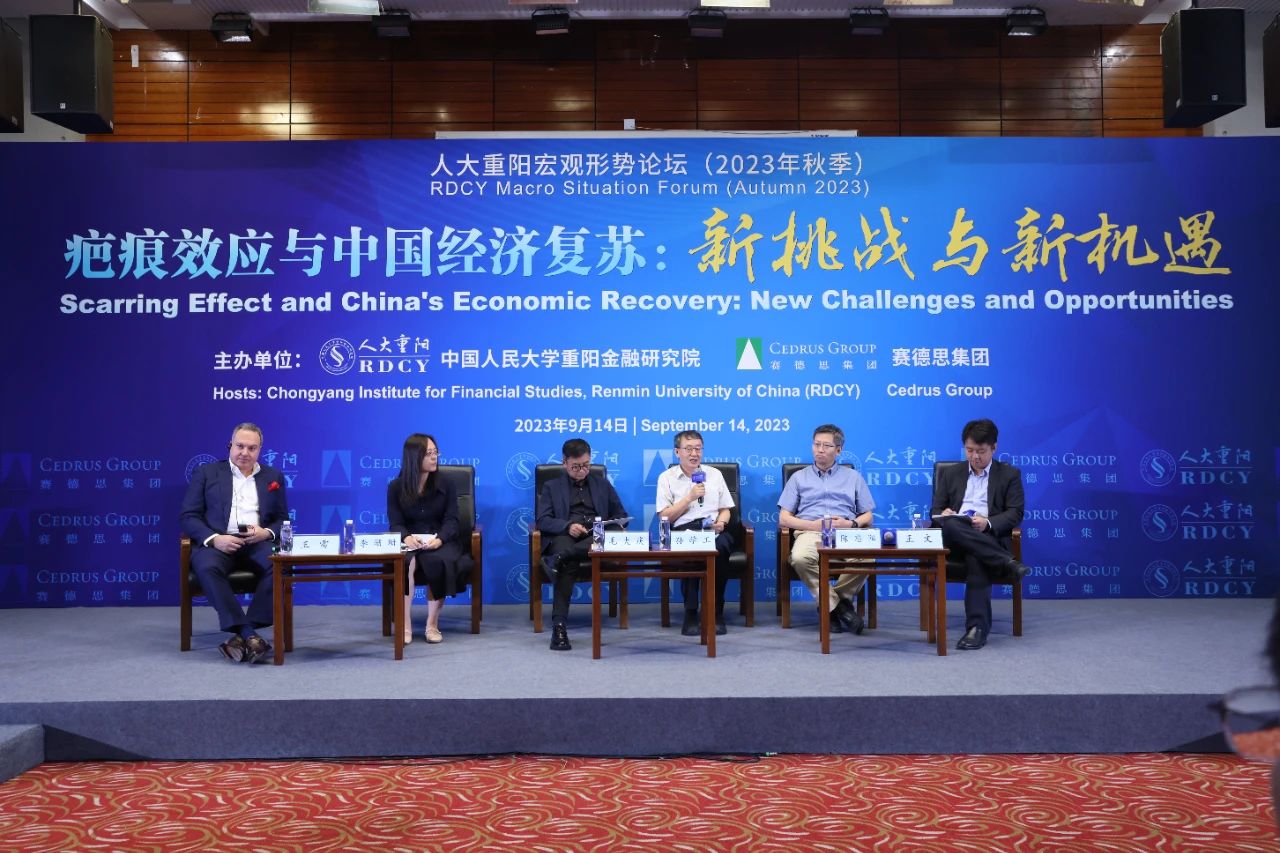
According to Mao Daqing, from 2050 to 2065, China will enter an unprecedented aging era, and in the next decade or so, the number of the aging population may go up, which will lead to major problems involving labor force and finance as well as some other serious problems caused by wide income gap and polarization. These problems will be magnified exponentially in an aging society, but as we move beyond 2070, it is likely that this structure will begin to “lighten” gradually. We must face up to the fact that the original engine of economic growth is overwhelmingly land and houses, and that the people's wealth is also created by land and houses, and that the proportion of our production, manufacturing and high technology contributes very little to economic growth.
Yuan Zengting stated that in recent years, many macro-analysis reports have a great difference in style from those ten years ago, which is closely related to the macro circumstances globally. Now, the global macro we are talking about should be global integration, regional economy and industrial chain integration. Nowadays we are facing new adjustments and opportunities because the global macro context has changed, and the current phase is a period of major uncertainty, which has lasted for a long time. Meanwhile, we need to pay attention to the cyclicity of policies.
Chen Zhongyang emphasized that risk is a subjective issue, where probability and distribution can be found, while uncertainty cannot, so risk can be expected and managed, while there are very few tools to deal with uncertainty. Investors are extremely averse to uncertainty, and risks should be left to the market to solve. Entrepreneurs are not afraid of risk, and even very willing to take risks under certain circumstances, however, they do not like uncertainty, and should leave uncertainty to the government. The role of the government is to provide a favourable environment for the development of enterprises and to reduce uncertainty as much as possible. The law is a very important tool, so are the government's strong capital power or economic strength, and information acquisition capability. Our greatest strength over the past 40 years has been the functioning of both government and market regulation mechanisms, and the combination of both will continue to be very significant in the future.
According to Li Shanshan, from the economic operation in August, some of China's economic indicators have started to show marginal improvement, but through the research of dozens of entrepreneurs and economists, and based on the analysis of the main economic policies and theories, the report points out that the current aggregate demand and market confidence is still insufficient. Only by accelerating the implementation of relevant reform measures proposed in the Decision of the Central Committee of the Communist Party of China on Some Major Issues Concerning Comprehensively Deepening Reform, adopted at the Third Plenary Session of the 18th CPC Central Committee and firmly applying rules-based, market-oriented, and internationalized methods, can market confidence be significantly boosted and China's economy be promoted to reach its potential growth rate as soon as possible. To this end, the report puts forward nine specific recommendations on policy optimization and reform deepening in three important areas: improving a fair and neutral competitive environment for market players, building an inclusive and modernized financial system, promoting market-based allocation reforms, and accelerating the transformation of government functions.























































































 京公网安备 11010802037854号
京公网安备 11010802037854号





